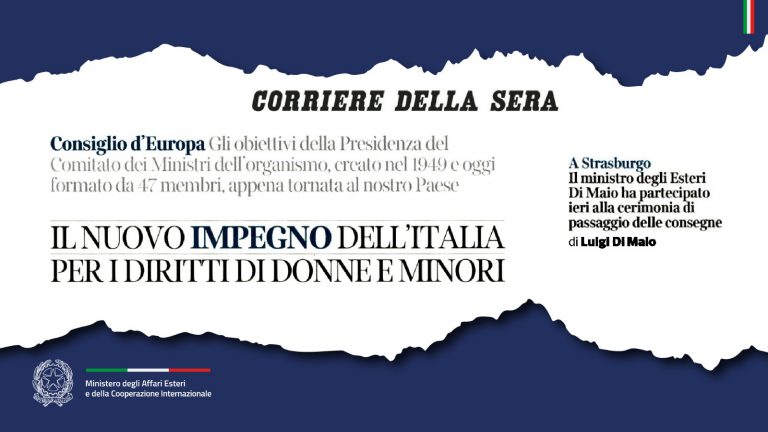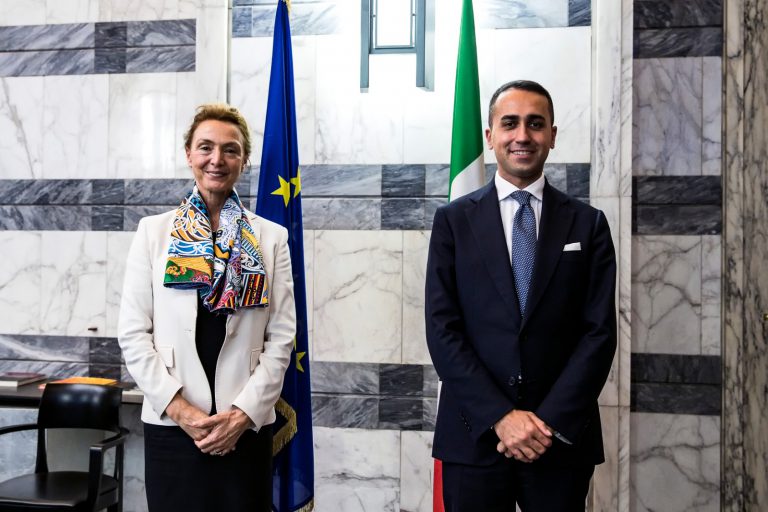This April will mark the 50th anniversary of the Pope John XXIII’s crowning encyclical “Pacem in terris”, the exalted words of which remain unaltered in their extraordinary moral vigour. Pope John’s intention was to advance truth, freedom, love and justice as the four pillars of peaceful co-existence. Unfortunately, we are forced to acknowledge today that peace, stability and security in many parts of the world are placed at risk each and every day by serious incidents of religious intolerance, sectarian tension and fundamentalist aberration. According to highly reliable estimates, last year more than 100,000 Christians around the world gave up their lives for their faith – only a few days ago innocent Christians were massacred in Nigeria by the Boko Haram sect. We cannot and must not accept this. There has to be a change in the international community’s approach in order to win civilisation’s fundamental battle against religious intolerance.
Governments and political forces are urged to fully do their part, with a courage and sense of responsibility equal to the gravity of the goal. It is also imperative that involve civil societies be involved, the recipients of numerous initiatives such as the Observatory on Religious Freedom in the World, whose implementing protocol was signed exactly one year ago in Rome, a centre for universal interfaith dialogue.
Over recent months Italy has maintained religious freedom’s place at the centre of the international debate through intense and constant bilateral, European and multilateral efforts. In the profound conviction that religious freedom is an essential catalyst in the promotion of human rights, Italy has made it the fulcrum of the ethical dimension of its foreign policy and has, in particular, promoted the rights of religious communities, especially minority ones, to publicly manifest their convictions and sensibilities.
Indeed, religious freedom must not be limited to the sole freedom to worship, much less be confined to individual or private spheres or reduced to mere formal State recognition. Rather, governments – first and foremost – have an obligation to act in such a way as to overcome prejudice and eliminate all forms of extremism. As Catholic partisan Primo Mazzolari declared, “freedom is the air religion breathes”.
Freedom of religion must therefore include the right to believe or to not believe, to convert, to pray publicly, to educate and to be educated, to contribute to public reflection and to participate in political choices. This conviction, which the two houses of parliament solemnly asserted in January 2011 by unanimously voting in two acts, underpins our commitment.
Europe has been a primary forum. I have worked incessantly in Brussels over recent months to spur the development of a higher European Union profile on the theme of religious freedom and the adoption of concrete measures. Some major advances have been made in just one year: the European Union created a task force with specific instruments that include a rapid alert mechanism; after intense negotiations, in which Italy was in the forefront, I managed to ensure that religious freedom would be included among the priorities of the EU’s Strategy for Human Rights, and an operational action plan was outlined and a special representative appointed.
Europe has also achieved major results in the UN. Two weeks ago the General Assembly plenary session reached consensus on a resolution on religious freedom and beliefs that the European Union promoted, along with another of similar content presented by the Organization of the Islamic Conference, thereby making it possible to build on the analogous accomplishments of December 2011. This important result was made possible not least by Italy’s unwavering commitment. In late September, the head of Jordanian diplomacy and I spearheaded a meeting in New York with government ministers of every faith and culture, representatives of associations and non-governmental organizations working in the field of education, to discuss the necessary collaboration between governments and civil societies for the purpose of protecting individual freedom through targeted educational programmes on rights and tolerance. Five months earlier my Indonesian colleague Natalegawa and I opened a conference in Jakarta dedicated to interfaith dialogue on the occasion of my visit to a nation whose 238 million inhabitants are 87% Muslim, making it the largest Muslim population in the world.
This is the direction we must continue to pursue, the only one capable of bearing real fruit, by encouraging respect for others, a principle universally recognised by all religions. This is why today, at the dawn of a new year, in the interests of continuity and the pressing nature of the theme, as its first official foreign policy act of 2013, the Italian Ministry of Foreign Affairs announces it will hold an international workshop on 11 February in Rome. The natural follow-up to the New York meeting, the workshop will be open to the participation of universities, research centres and the media – including the social media – all of whom are actors that must become “agents of understanding” committed to fostering dialogue between faiths, cultures and civilizations. Tolerance is no longer enough, we have to work toward true co-existence based on full respect for the identity of others.
In this spirit I would like to close by recalling that a few days from now it will be three years since the death of one of our community’s most courageous sons, united in values and sentiments: Father Gian Battista Maffi, Bergamo-born missionary who devoted his existence to the poor and forgotten, and who spent what would be the last years of his life in Arabic and Islamic studies, weaving a dense network of deep relations with many Muslim scholars.
In order to honour a person such as that and all the martyrs of all faiths, we must allow ourselves be guided, once again, by the precious teachings contained in “Pacem in terris”: authority is, above all things, a moral force and must therefore be the first to appeal to the duty that is everyone’s to willingly contribute to the good of all.



